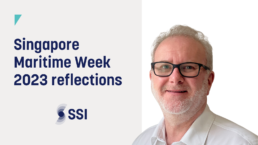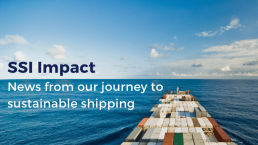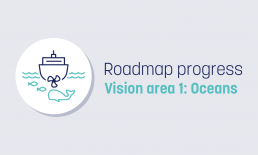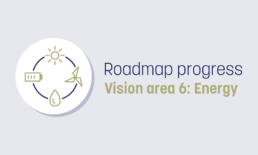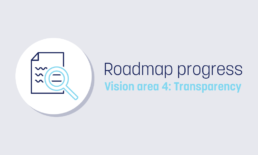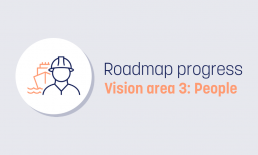Singapore Maritime Week 2023

04 May 2023 – I attended various events at Singapore Maritime Week in May 2023, under the theme ‘where ambition meets action.’ A third of the way through this decade of action, this focus is necessary and it was inspiring to be surrounded by the buzz of an industry undergoing a massive transformation.
Where ambition meets action
First movers are paving the way for shipping’s decarbonisation, which will inevitably transform the way our industry operates. From sessions on green corridors, highlighting lessons learnt from the pilot tests and key opportunities available, to leaders like MPA Singapore showcasing greater visible leadership on sustainability, it’s clear that the industry is rolling up its sleeves. And whilst we must congratulate and shine a light on the initiators, we must not forget the importance of supporting the entire sector in this transition. Different speeds of adoption and change are to be expected, but we must all act fast to ensure a smooth transition. We cannot let perfect be the enemy of the good, and learning as we go is not only okay but expected.
Transparency and collaboration
Data visibility and transparency were a core part of many discussions. From operational efficiency measures to voyage planning to reduce congestion, emissions, and pollution, data sharing is essential for progress as well as for mitigating supply chain risks. As an industry, we need to overcome the fear of data sharing and transparency impacting commercial advantages if we are to successfully build a more sustainable maritime sector.
Individual companies and collaborative initiatives are generating data and information at a rapid pace – from fuel testing to new technologies to green corridor development. Their outcomes, learnings, and next steps are valuable to advance industry-wide sustainability progress, work towards a common goal, and unlock the investments necessary for shipping’s decarbonisation.
Stakeholder inclusion
We need to better understand the intersection between shipping, port infrastructure, and people to ensure unified progress on all fronts. In this regard, the inclusion of people, from our seafarers to shore-based workers and local communities, could have been incorporated more in many of the discussions. As those directly impacted by operational choices, including our workers (present and future) and local communities in decision-making processes is vital for business – and the right thing to do. Doing so is the only way to build an equitable industry that benefits all stakeholders within and connected with shipping.
Having a multi-stakeholder approach to decision-making will enable a successful and resilient transformation to a just, decarbonised future for shipping. Issues such as diversity at sea, air quality impacts on coastal communities, and seafarer recruitment fees must be addressed to create a resilient, inclusive, sustainable shipping industry.
SSI presents at GREEN4SEA
21 April 2023 – On Wednesday 29 March, Andrew Stephens took part in a Sustainable Shipping panel at the GREEN4SEA Forum in Athens, Greece.
SSI, alongside panellists from Zero Emissions Ship Technology Association and European Community Shipowners’ Association, discussed key focus areas and sustainability challenges for 2023 as shipping continues its work towards sustainability during this decade of action. As a key component of global trade, shipping plays a critical role in supporting and establishing resilient global supply chains that can adapt to the climate crisis.
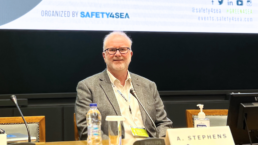
Shipping has a responsibility to play its part in addressing the causes and impacts of the climate crisis holistically. Particularly when developing new fuels and technologies as the sector races to decarbonise. It is vital to consider the impacts and externalities across the E, S and G to ensure a sustainable transition.
Andrew highlighted the importance of avoiding ‘carbon tunnel vision’ and addressing sustainability challenges systemically, in order to build a future-proof, resilient shipping sector to support global trade for generations to come.
Click here to watch Andrew’s GREEN4SEA presentation.
Read Safety4Sea’s article on Andrew’s presentation here.
SSI Impact: News from our journey to sustainable shipping - 01/2023
The SSI Newsletter is published quarterly and is the place to find news from the SSI community, our partners and the impact of our collective work along our journey to a sustainable shipping industry.
Subscribe to SSI Impact: News from our journey to sustainable shipping
Seafarers and recruitment fees: Research briefing
The results of a new study of seafarers finds that over two thirds (70%) of seafarers who have experienced violations of their workers’ rights say they were either charged recruitment fees – an illegal practice that can result in significant levels of debt leading to forced labour conditions – or were victims of fake job offers after making advance payments.
The Seafarers and Recruitment Fees research briefing, published by the Institute for Human Rights and Business (IHRB) and the Sustainable Shipping Initiative (SSI), surveyed almost 5,000 seafarers between September 2022 and February 2023. The research shows that of those who experienced illegal charging of recruitment fees, the large majority (71%) did not report it, in most cases because they didn’t know where to report such abuses.
The survey was conducted by TURTLE and designed by TURTLE in conjunction with the Maritime Anti-Corruption Network (MACN).
Mediterranean to become an ECA by 2025
Progress against milestone 1.2030.1:
Shipping-related ocean governance is strengthened, with improved coordination on ocean impacts and issues and ramped up enforcement of laws and regulation
The Mediterranean will become the fifth sulphur oxide emission control area (ECA).
As of May 2025, all fuels used in ships passing through the Mediterranean will have to follow a sulphur limit of 0.1%.
Source: IMO.
FuelEU Maritime
Progress against milestone 6.2030.2:
Mid- and long-term measures implemented and national regulation incentivising and ensuring the uptake of zero (or low) carbon fuels and technologies in place.
The European Union has agreed to reduce net greenhouse gas (GHG) emissions by at least 55% by 2030 in order to reach climate neutrality by 2050.
FuelEU Maritime assists in this by reducing GHG emissions from the shipping sector by promoting the use of cleaner fuels and energy. It mandates a gradual decrease in the GHG intensity of fuels, complementing the EU ETS.
Source: European Parliament.
UN adopts resolution requesting the International Court of Justice provide advisory opinion on States' obligations concerning climate change
Progress against milestone 4.2020.4:
Supply chain transparency across the ship lifecycle demanded by customers and factored into decision making process.
The United Nations General Assembly has adopted a resolution requesting that the International Court of Justice (ICJ) provide an advisory opinion on states’ obligations concerning climate change.
Led by Vanuatu and co-sponsored by over 130 countries, it is the first time that ICJ has been asked to clarify the obligation of states to protect the climate system and the legal consequences of failing to meet them.
Source: United Nations
SBTi Compliance policy comes into effect
Progress against milestone 4.2030.5:
Sustainability performance data is audited, validated and made publicly available.
The Science Based Targets Initiative’s (SBTi) compliance policy came into effect on the 31st of January.
Companies that fail to submit their targets for validation within 24 months will be highlighted on SBTi’s website target dashboard.
Source: Science Based Target initiative.
UK Seafarer Wages Act
Progress against milestone 3.2020.5:
Workers across all phases of ship lifecycle, onboard and offshore, have access to union representation and their working and living standards are improved.
The Seafarer Wages Act is now part of UK law.
A key part of the government’s 9-point plan for seafarers, the new law protects those working on vessels that operate an international service from being paid less than the national minimum wage. The action plan grants British ports the power to refuse access to ships that fail to comply.
Source: UK Parliament
Magna Carta for Filipino Seafarers
Progress against milestone 3.2020.5:
Workers across all phases of ship lifecycle, onboard and offshore, have access to union representation and their working and living standards are improved.
The Philippines House of Representatives has voted in a bill that seeks to protect the rights and interests of Filipino seafarers.
The law, Magna Carta for Filipino Seafarers’ sets out labour protection terms for seafarers before, during, and after employment.
Source: Philippine News Agency

